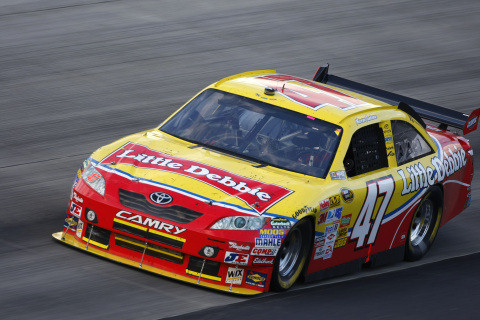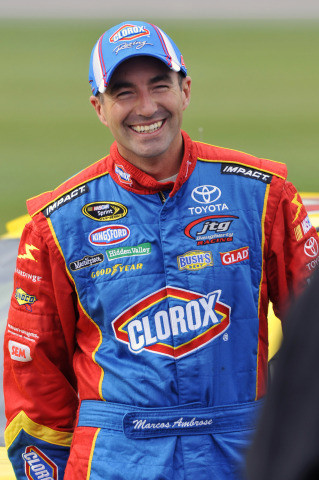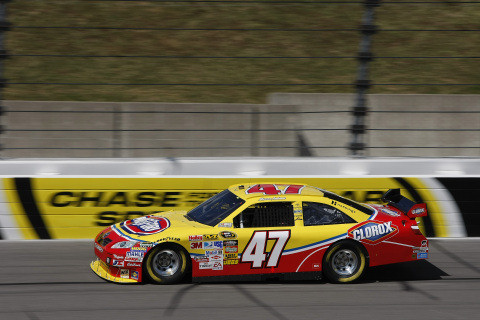The Way It Is/ Marcos Ambrose's NASCAR lessons
by Gordon Kirby In case you didn't know, Juan Montoya isn't the only foreigner racing in NASCAR's Sprint Cup series. Marcos Ambrose, an amiable 33-year old Australian from Tasmania, is in his first full Cup season with JTG/Daugherty/Michael Waltrip Racing's #47 Toyota. Ambrose started racing in America in 2006 with JTG/Daugherty in NASCAR's truck series, moved up to the Nationwide Series in '07 and ran eleven Cup races last year. Ambrose won the Nationwide race at Watkins Glen in 2008 and finished third in last year's Glen Cup race behind Kyle Busch and Tony Stewart and ahead of Montoya.
In case you didn't know, Juan Montoya isn't the only foreigner racing in NASCAR's Sprint Cup series. Marcos Ambrose, an amiable 33-year old Australian from Tasmania, is in his first full Cup season with JTG/Daugherty/Michael Waltrip Racing's #47 Toyota. Ambrose started racing in America in 2006 with JTG/Daugherty in NASCAR's truck series, moved up to the Nationwide Series in '07 and ran eleven Cup races last year. Ambrose won the Nationwide race at Watkins Glen in 2008 and finished third in last year's Glen Cup race behind Kyle Busch and Tony Stewart and ahead of Montoya.
Ambrose's father Ross raced formula cars in Australia and Europe and Marcos followed in his dad's footsteps. He raced karts and Formula Fords at home then went to Europe in 1998. Marcos raced successfully in Formula Ford in the UK and Formula 3 in France before moving back to Australia where he won the V-8 Supercar championship in 2003 and '04 scoring no fewer than 27 race wins.
"I started racing go-karts when I was nine or ten and I took to it like a duck to water," Marcos grins. "I lived in the state of Tasmania, which is a pretty cool place, and I raced against the same bunch of kids for about five and a half years. We got to know each other very well and raced each other pretty hard too."
Ambrose's first race car was a Swift Formula Ford followed by a van Diemen. He won a few races, then decided to tackle Formula Ford and F3 in Europe.
"I won races in Formula Ford in the UK and F3 in France," he relates. "But it was getting so expensive and I couldn't find the budget to do it properly. So I decided to go back to Australia and try to reinject myself into Australian racing. I was lucky enough to sign up with the Stone Brothers and went on to win a couple of championships."

© LAT USA
"I viewed myself as an international driver and I felt like I'd done everything I could in Australia," he remarks. "So I decided to come over to the United States and relaunch my career again, and stock car racing was where it's at. I'd been down the single-seater route and Champ Car was going through its turmoils and NASCAR was going from strength to strength. I watched the NASCAR races on TV and liked and appreciated the sport so I packed the family up and we moved over and started again.
"I just started knocking on doors and making phone calls. I've always been brave and never been afraid to make a mistake. I knew that coming to America was a big risk, a gamble, but you only live once and I wanted to come across and have a go.
"I thought Grand-Am was going to be the road I was going to take to get to stock cars but it turned out I didn't need to do that. We landed here in America and looked around for a ride and JTG Daugherty tested me and signed me up. JTG Racing gave me a chance in the truck series in 2006 and I got a pole and a few good results and the rest is history. I've been climbing the NASCAR ladder ever since."
Ambrose says the tremendous depth of NASCAR's field has made him a better driver.
"The level of competition is just incredible," he comments. "It looks big on TV but when you get in there and see how talented the field is and how much money is invested and how intense the racing is, it's just lifted up my level of performance no end. I'm a much better driver than I was before I came to America because you have to. The depth of talent is so big that it's just remarkable.
"Anyone from Australia or Europe has just got to come here and see it for themselves. You can't appreciate it from TV. They will be amazed at how tough it is and how deep the talent goes."
Ambrose's excellent performances in the Nationwide and Cup races at Watkins Glen and the Nationwide race in Montreal caught the attention of many people. But Marcos is deeply aware that running at the front on road courses is just the first step in his pursuit of success in NASCAR.
"You've got to do it at all the tracks from Bristol to Daytona," Ambrose observes. "There's no doubt that I've adapted well to road racing in stock cars. There are a lot of very talented race car drivers from open-wheel that have come in and struggled. Montoya has adapted very, very well, but a lot of talented drivers have had a hard time adapting to stock cars. To me, driving an over-powered, ill-handling race car suits my style. I'm not afraid to drive it hard and make it go where it wants to go.

© LAT USA
Ambrose has developed great respect for NASCAR's top drivers.
"There's a special set of drivers who are the best in Cup cars and it's a never-ending quest for me to find out what they do and how they do it. To turn up every weekend with a competitive car for every track takes real talent and it's a skill set that very few people have got."
Over the past decade most NASCAR teams have been bolstered by an influx of engineers from Indy cars, Formula 1 and sports car racing. But the driver and crew chief remain in command.
"NASCAR is unique," Ambrose remarks. "Ten years ago there wasn't an engineer in the garage. Now it's dominated by engineers. Yet NASCAR has regulations that prohibit the gathering of data so the engineers and the drivers are working blind-folded. You don't have the pages of data to read through and look at that you do in other types of racing. So making these cars work is an art. There's still more art than science in making these cars run well. You've got a great engineering support base but at the end of the day it's about your seat-of-the-pants experience about the track and weather conditions.
"I think we're in a special period in NASCAR's history with the cross-over going on between engineers and seat-of-the-pants crew chiefs, and I don't know which way it's going to fall. I guess the way NASCAR continues to tweak the regulations keeps us guessing. There will always be room for both styles of running race teams and race cars.
"There will always be room for engineering and it will probably become more dominant as the teams get better and their refining of their engineering analysis gets better. Over time the engineers will make it more consistent, but there will always be room for seat-of-the-pants engineering from the drivers and crew chiefs.
"Whenever you get driver aids like ABS brakes, sequential gearboxes and paddle shifts, the racing deteriorates," Ambrose adds. "NASCAR want the best driver to win the race and they do that every week. And you can't say that Formula 1 does that every week."
Parnelli Jones fervently believes that all types of racing, like NASCAR, should ban "all that electronic junk" and not allow any data gathering on race weekends. Ambrose has become a great believer in this maxim and in the ugly handling of the dreaded CoT.
"I think it's wonderful," he glows. "For the driver, you know you've won the race and no one else knows how you did it. NASCAR's trying really hard to keep it out of the hands of the engineers. They don't want the car to handle well. Their mission was to make this the toughest race car in the world to drive and they've done that. It's a real challenge for all of us."
Ambrose has become a total believer in oval track racing.
"I think the format is great and the racing is great," he says. "Oval racing is fantastic. The ability to see the whole event in front of you with a beer in one hand and a hot dog in the other for three or four hours is unique. There's not another form of racing like it. I think it's a great time to be in this sport and see it unfold."
Equally, he's enjoying the challenges involved in coming to grips with oval racing.

© LAT USA
"Oval racing is all about feeling all four individual tires. What tire is working and which tire is not working? It really changes the way that you acquire feedback and the way you feel the car. And you've got to be able to run on the apron if you have to, or run three-wide in the middle. You've got to run on the edge all day in this car and that's a big challenge.
"The other thing is each day at any oval is different. Weather and track conditions change each day and you run to the very edge of performance. Very small changes in atmospheric pressure or tire pressure or the clouds coming over or the rubber going down changes the way the track responds. It's quite amazing how the track never stops changing."
Ambrose dominated the Nationwide race at le Circuit Gilles Villeneuve in Montreal at the end of August, leading all the way until the last turn. He made a tiny mistake and bounced off the curb in the middle of the last turn allowing the closely-pursuing Carl Edwards to win the race. Marcos says he maintains a philosophical view of that loss.
"Races come and go," he remarks. "You can make an error at the start of the race or anytime through the race. I dodged a lot of balls that day. I managed to be fast and to hit the restart right every time and get away from whoever was behind me. But I was vulnerable on the last restart. We were on wet tires and the car and me weren't as dominant as we had been and Carl closed the gap and put me under pressure. It wasn't my error. It was forced on me.
"I was disappointed for sure, but I felt bad for my guys because they always work so hard. When I'm driving the car I'm not driving for myself. I'm driving for all my guys and their families and the sponsors and the fans. So when you make a mistake like that I don't feel bad for myself but I feel bad for everybody else.
"I just let it go," he adds. "I was beating on myself for two days. But you can't take it back. I read a book about how to take the right approach to competing successfully in sports or life. You have good games and bad games but you can't spend time thinking about what you did wrong. You've got to come back the next day with your mind clear and just do the best job you can. I think that's the way you've got to be. You can't get carried away with bad thoughts. You've got to believe you're only one race away from victory."
Ambrose gives himself three to five years to make it or not in NASCAR.
"I'm very fortunate to have JTG behind me," he comments. "I'm really focused on trying to win races. I'm going to find out pretty quickly whether I'm going to make it or not. It's okay to run twentieth, but it's not where I want to be or where my guys want to be. So I'm going to try my very best. I've come a long way in the past twelve months. I've really improved a lot. Now I've got to go to the next step and that's going to be the key.
"I want to give myself three to five years and give it my very best shot. I feel privileged to be given this opportunity. It's great as long as you're showing promise and moving forward but you can get stale in a hurry and I'm very conscious of getting stale. Whether I'm good enough to bridge that gap, time will tell."
After twenty-nine of this year's thirty-six Sprint Cup races Ambrose is ranked a very respectable seventeenth in points directly behind teammate David Reutimann and ahead of such NASCAR notables as Jeff Burton, Kevin Harvick and Dale Earnhardt Jr. And he's contracted to JTG Daugherty through 2011.
"It's an awesome experience," Marcos grins. "I never dreamt I'd be a race car driver. I just loved racing and feel lucky to have done it. I just try to enjoy every race I do. I never thought I'd get to where I am today, but here I am in the middle of it all."
Ambrose has attracted a substantial fan following here in the United States and says he enjoys a bigger fan base at home in Australia than when he raced Supercar V-8s down-under. He's an extremely good-natured fellow and a tough racer. It will be interesting to see if he can take the final step of his career into NASCAR's front rank of drivers.
Auto Racing ~ Gordon Kirby
Copyright 2009 ~ All Rights Reserved
Copyright 2009 ~ All Rights Reserved
Top of Page